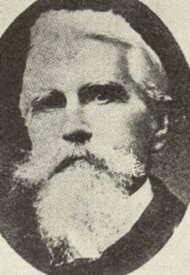By William Alfred Rose (Alabama 1921, Yale 1924)
Back to History Articles page
On April 12, 1861, Fort Sumter, located on a small island commanding the entrance to the harbor at Charleston, was fired on by South Carolina troops using a battery of cannon mounted on the mainland. The fort fell the following day. This marked the beginning of hostilities in the War Between the States, which was to take more casualties than any other conflict in all history until World War One.
Because neither the Confederacy nor the Union had any professional army to speak of, no further hostilities of any kind occurred for almost a month, the intervening time being taken up with the recruiting and training of troops on both sides.
The Third Alabama Cavalry was composed largely of men from the famous "Black Belt" of that state, a rich agricultural section. The regiment was sent to a concentration camp at Pensacola, Florida, for training. Shortly after its arrival at the camp word was received that a Union ship had been sighted off the coast and it was thought that an effort would be made to attack the camp. Several detachments of the troops concentrated at the camp were detailed to watch various parts of the coast. Among them was a squad selected from the Third Alabama Cavalry, composed of eight privates and a second lieutenant. The officer in charge of that squad was Samuel Calvin Cook (Howard 1859).
SKIRMISH ON PENSACOLA BAY
May 9, 1861, dawned cloudy and misty with a heavy fog hanging over Pensacola Bay. Cook and his squad were keeping their eyes and ears alert for signs of the reported ship. Suddenly, as the fog lifted, they saw several small boats containing United States Marines engaged in making soundings in the bay. Upon challenging the boats, Cook and his squad were greeted with a volley of rifle shots. Cook thereupon deployed his squad and opened fire on the boats.
Those in the boats were apparently confused over the number of the force on shore, which appeared to them to be much larger than was actually the case, and they thereupon began rowing toward their ship, which had anchored during the night in the bay and which promptly thereafter sailed away. No casualties were sustained on either side.
So far as historical records disclose, this marked the first skirmish in which small arms were used during the War Between the States.
ABOUT BROTHER COOK
Samuel Calvin Cook, who commanded that squad, was born November 6, 1837, on a plantation in Wilcox County, Alabama, in the heart of the "Black Belt." He was a son of Daniel and Martha (Warren) Cook, his father having been a native of Chesterfield County, South Carolina, and after having served in the War of 1812 removed to Georgia and thence to Wilcox County in 1829.
 Picture of Brother Cook from The Phi Gamma Delta magazine. The original source of the picture is unknown.
Picture of Brother Cook from The Phi Gamma Delta magazine. The original source of the picture is unknown.
Samuel Calvin Cook was educated in private schools in Wilcox County and entered Howard College in 1856. It was while he was a student there that he was initiated into the old Mu Chapter of Phi Gamma Delta. He was graduated as valedictorian of his class with the degree of bachelor of arts in 1859. Following his graduation he read law in private offices, but his study of law was interrupted by the outbreak of the War Between the States in 1861. He served throughout that war, during three years of which time he served under General Joe Wheeler. He was a member of that officer's famous staff of picked men known as the "Elite Corps," which was an organization composed of one commissioned officer and two privates from each company, selected for their soldierly qualifications and trained by West Point graduates for hazardous and daring duties.
Following the close of the war he took up the practice of his profession at Camden, county seat of Wilcox County. He was noted as a campaign speaker and was constantly in demand in political and other campaigns. He was instrumental in the overthrow of the carpet-bag rule in his county and for 22 years was a member of his county Democratic executive committee, being also a member of the state legislature for one term. He devoted a great deal of his time to horticultural and agricultural pursuits, making a special study of fruits. He wrote and published numerous articles on fruit culture. He organized the State Farmers' Alliance in 1890. In 1861 he married Mary Harrell of Mobile and had 14 children. He died at Camden on June 8, 1904.
OLD MU CHAPTER
Cook was but one of a number of outstanding men who were members of the original Mu Chapter. That chapter was chartered in 1856 and was believed to have disbanded with the outbreak of the war in 1861. It was never revived. It had a total enrollment of only 26 members; they were a remarkable group and left their mark on their communities. Among them were a college president, a college professor, three state legislators, two judges, four clergymen, five lawyers, two physicians and five planters. See a list of these men and more about the Mu Chapter.
We welcome assistance, feedback, and inquiries. Related articles: